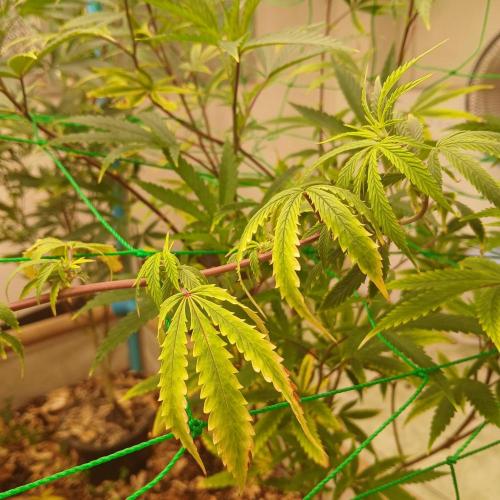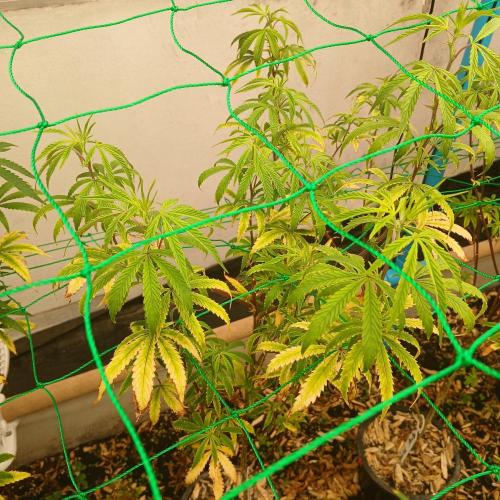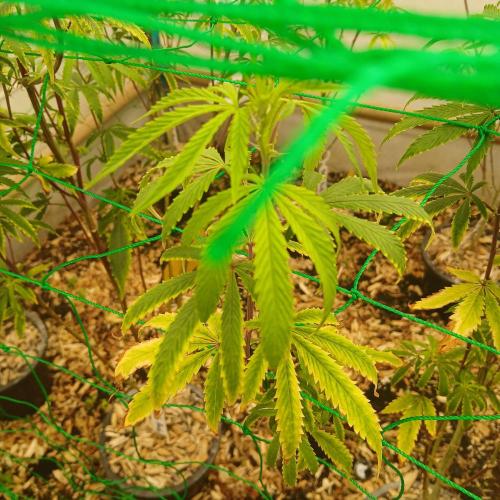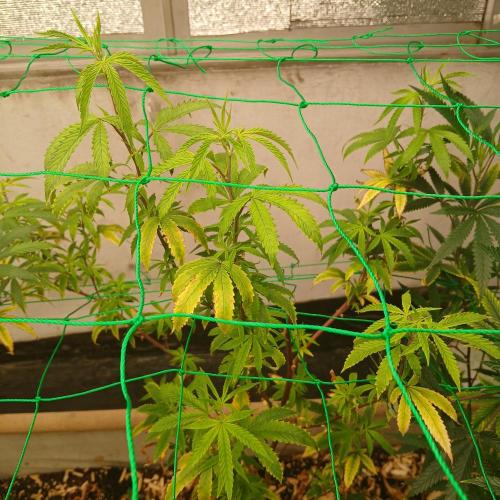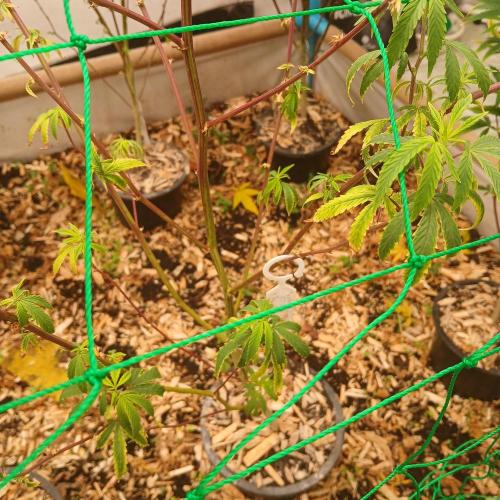The Grow Awards 2026 🏆 




























No-till cannabis I don't know. Please check the symptoms
mawintinner60started grow question 4mo ago
No-till cannabis I don't know. Please check the symptoms
Solved
Leaves. Tips - Burnt
likes
Ultravioletanswered grow question 4mo ago
I'd highly advise you learn to grow using synthetic nutrients that are readily available in final form. All organic really means is "yet to be broken down". In a perfect world organic is better as its all about the micros, but you lose your ability to control your nutrient ratio which can easily be skewed.
The more organic processes you have being broken down the more chances you have for losing control.
Copied the following from Google to give you a idea.
Complications of exceeding 5% organic matter
1. Nutrient imbalance and toxicity
Mineralization surges: During decomposition, organic matter can release large amounts of nutrients in a short time. This sudden surge can lead to nutrient toxicities and inhibit the plant's ability to absorb other essential minerals.
Excessive nitrogen: If a large volume of low carbon-to-nitrogen (C:N) organic material (like some manures) is added, it can release too much nitrogen, leading to excessive vegetative growth at the expense of flowering and fruiting.
Salt buildup: Composted materials, especially manure-based compost, can contain high levels of soluble salts. Without regular leaching from rainfall (as in container gardening or high tunnels), these salts can accumulate and cause plant toxicity.
Excess phosphorus: Manure-based composts can also lead to an excessive buildup of phosphorus. This can interfere with the plant's uptake of other nutrients, such as iron and zinc, leading to deficiencies.
2. Poor soil structure and aeration
Compaction: Incorporating a large amount of organic material into wet soil can lead to compaction as it decomposes, displacing air pockets that plant roots need to breathe.
Waterlogging: A heavy composition of organic matter can cause a growing medium to hold too much water. This leads to poor drainage, suffocating plant roots and fostering anaerobic (oxygen-free) conditions that can kill beneficial microbes and promote root diseases.
Breakdown of structure: As organic material continues to break down, the medium's structure can collapse, reducing overall porosity and aeration.
3. Allelopathy and pathogens
Allelopathic compounds: Some plant-based materials, like wood chips, can release chemical compounds during decomposition that inhibit the growth of other plants. This effect, called allelopathy, can reduce yields and suppress root growth.
Disease: Excessive and unmanaged organic matter can harbor pathogens and increase the risk of disease, especially in greenhouse or high-tunnel settings.
4. Nitrogen immobilization
High C:N ratio: Conversely, if the organic material has a very high C:N ratio (like sawdust or straw), microbes will pull existing nitrogen from the soil to facilitate decomposition. This can temporarily rob plants of nitrogen, causing a nutrient deficiency.
How to use organic matter correctly
The correct approach is to add organic matter gradually over time and monitor the soil's composition. For gardens, applying a half-inch layer of compost once or twice a year is often sufficient. For raised beds, a mix of mineral soil and compost (starting at around 10% compost by volume) is a better starting point than using pure compost. A soil test can help determine the existing organic matter content and guide a more precise application strategy.
Good luck in your growing journey.
2 likes
Complain
Similar Grow Questions
Solved

Aleatoric
Possibly Potassium Deficient? Based on ALL the pics I could find, but not sure.I noticed these brown splotches and leaf edges on one area bud and pistils of my Orange Sherbet last night. Based on what I can find online, this might be potassium deficiency?
This is mostly on one spot near darkest edge when tent closed. Thanks!
2y ago
3
3
Solved

zaffieken
Got some burned tips at the top of my plant. Secind time I have this with a plant ...
Got to have something to do with feeding. (Temps, airflow and lights ok)
Just gave her plain water for 5 days, started feeding again, cause it didn't got better, but worse. Anyone?Week 15
Leaves. Tips - Burnt
7y ago
1
Solved

Trickybis82
What is the problem here?What could this be? Any idea my fellow growmies.. I see leaf discoloration and leaves turning into claws and breaking.. so I flushed her out using flash clean and then re-watered with nutes and I think i still have a problem look at pics and video any help is much appreciated
Leaves. Tips - Burnt
Leaves. Curl down
Leaves. Color - Dark-brown
4y ago
3
4
Solved

Vortex
Wait plz, put me out miseryWhat kind of deficiency?!
Help me to fix this 💩😁👌
Leaves. Edges burnt
Leaves. Tips - Burnt
Leaves. Curl down
5y ago
2
2
Solved

GermanGuerilla420
Lockout or not enough nutsthe plant gets yelloish with brown spots ant brown leave tips i checked the ph an how ever it was about 4.8... i flushed the soil to a ph of about 5.2 and gave her a little feeding.
Temps between 23 and 26 c°, the light is very close.. might be to close
Its a Autoflower
Leaves. Tips - Burnt
Leaves. Color - Yellow
4y ago
2
2
Solved

Little_Pot
Brown burnt tips on smallest leavesToday I noticed that smallest leaves are getting brown tips. Yesterday I sprayed her with diy insecticide against thrips(soap, alcohol and h2o2). Could it be light burn or nutrient burn? She grows in bio bizz all mix which is heavy fertilized, and gets no extra nutrients.
Week 3
Leaves. Tips - Burnt
4y ago
5
3
Solved

Thecouple
6 weeks old turning leaves turning yellow and dropping at a fast rate.is this related to nutrition lock or PH. started with fan leaves and now going to new leaves. turning yellow then blue spots then drys out and falls. its an American pie and about 6 weeks old.
Leaves. Tips - Burnt
Leaves. Dropping off
Leaves. Color - Yellow
4y ago
6
9
Solved

kegman83
I think I'm experiencing transplant shock on my Durbin poison plants, but I cant be too sure. I tore some roots accidentally in transplant but that was weeks ago. They still seem to be holding on but advice is appreciated. Also, any advice on what might be munching on my Blue DreWeek 3
Leaves. Tips - Burnt
7y ago
6
5
Solved

Dbkoop
Mg deficiencies? RDWCI have a Lemon auto RDWC and Blue dream auto in ffof mix. Both are showing some deficiencies or something no. Both have dark green veins and have like a gradient effect where it gets lime green to yellow inside outwards and a few burnt tips. Any advice?
Leaves. Tips - Burnt
Leaves. Veins - yellow between
Leaves. Color - Yellow
4y ago
3
Solved

Max_Dune
Week 8 - Godzilla Cookies Auto - Feels like they are substantially behind. Thoughts on pest management or feeding schedule tweaks?Day 54 - Godzilla Cookies Auto. Dealing with whiteflies, soil gnats & a caterpillar (now removed). Currently using neem oil spray & adjusted watering. Plants are full sun/30% shade daily. Avr Temp 20°, Avr Hum 56%
How do these look? Are we good, or 'newbie' grow OCD?
Leaves. Edges burnt
Leaves. Tips - Burnt
Plant. Spaces between nodes
1y ago
6
5
Solved

WeedDude
lightstress, lockout, nuteburn, nute deficit, age, genetics, ...?lightstress, lockout, nuteburn, nute deficit, age, genetics, ...?
place your bets ladies and gentlemen would love to hear your opinion.
details in diary week 15 and comment DAY 109 - DAY 61 Flowering
Thank you very much 😀
4y ago
3
3
Solved

Kaptngrow
nutrient burn or light burn?17 d after seeding Pinnapple Kush Cake Automatic. 2L pots since 5 days.
600 PPFD LED 19/5; 45% humid; 26°C PH 6,5
Yellow to brown leaf-tips at 2 of 4 plants since 3 days.
Is it beginning of a serious problem of to much light or more from to much fertilizer in the potting soil?
Leaves. Tips - Burnt
3y ago
5
3
Solved

Sider79
What would be the best flower booster for my situation? I would like to see much more flower activity for a good finally.Week 5
Leaves. Tips - Burnt
6y ago
5
5
Solved

MRHERB
Fastbuds girl scout cookies, nit surebif it is nute burn or light stressHello errrbody just want to find out if anyone knows what this might be thank you.PH 5.9 and only feeding calmag
Leaves. Tips - Burnt
Leaves. Color - Yellow
6y ago
5
6
Solved

DRunKenMONkey271
Yellow and burnt leavesYellow on one side and pretty much green on the other. Why? Lol I'm light on the nutes. I dont think I've been giving to much. Maybe not enough? I hope it makes it.
Leaves. Tips - Burnt
Leaves. Color - Yellow
Leaves. Color - Pale
5y ago
3
3
Solved

Ghost24
Yellowing from the topRuntz Auto
Week 6 of flowering
Growing hydroponics using silica, MJ plant prod finisher, cal mag, hydroguard, root drench, bud enhancer and sweetener. Mixed exactly in that order.
pH 5.9 (using pH pen for readings)
yellowing from the top
I don't have ppm/EC meter or light meter
Leaves. Tips - Burnt
Leaves. Color - Yellow
2y ago
3
4

